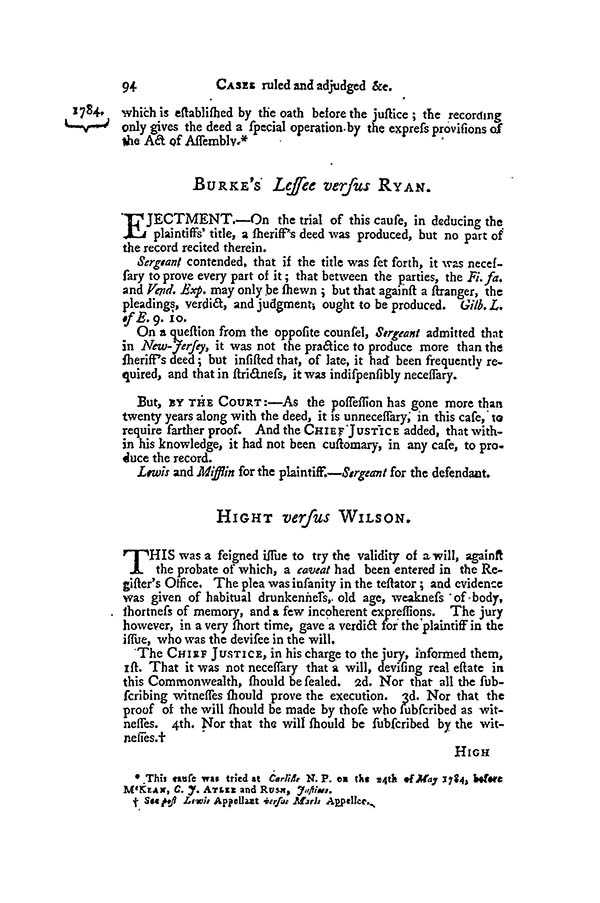Burke's Lessee v. Ryan, 1 Dall. 94 (Pa. 1784) and Hight v. Wilson, 1 Dall. 94 (Pa. 1784)
Supreme Court of Pennsylvania
September Term, 1784
Burke's Lessee versus Ryan.
Ejectment.—On the trial of this cause, in deducing the plaintiffs' title, a sheriff's deed was produced, but no part of the record recited therein.
Sergeant contended, that if the title was set forth, it was necessary to prove every part of it; that between the parties, the Fi. fa. and Vend. Exp. may only be shewn; but that against a stranger, the pleadings, vverdict, and judgment, ought to be produced. Gilb L. of E. 9. 10.
On a question from the opposite counsel, Sergeant admitted that in New-Jersey, it was not the practice to produce more than the sheriff's deed; but insisted that, of late, it had been frequently required, and that in strictness, it was indispensibly necessary.
But, by the Court:—As the possession has gone more than twenty years along with the deed, it is unnecessary, in this case, to require farther proof. And the Chief Justice added, that within his knowledge, it had not been customary, in any case, to produce the record.
Lewis and Mifflin for the plaintiff.—Sergeant for the defendant.
Citation: Burke's Lessee v. Ryan, 1 U.S. 94, 1 Dall. 94 (Pa. 1784)
Hight versus Wilson.
This was a feigned issue to try the validity of a will, against the probate of which, a caveat had been entered in the Register's Office. The plea was insanity in the testator; and evidence was given of habitual drunkenness, old age, weakness of body, shortness of memory, and a few incoherent expressions. The jury however, in a very short time, gave a verdict for the plaintiff in the issue, who was the devisee in the will.
The Chief Justice, in his charge to the jury, informed them, 1st. That it was not necessary that a will, devising real estate in this Commonwealth, should be sealed. 2nd. Nor that all the subscribing witnesses should prove the execution. 3rd. Nor that the proof of the will should be made by those who subscribed as witnesses. 4th. Nor that the will should be subscribed by the witnesses.†
Citation: Hight v. Wilson, 1 U.S. 94, 1 Dall. 94 (Pa. 1784)

Last modified: December 11, 2014